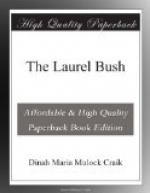I am afraid that this Fortune Williams will be considered a very weak-minded young woman. She was not a bit a coquette, she had not the slightest wish to flirt with any man. Nor was she a proud beauty desirous to subjugate the other sex; and drag them triumphantly at her chariot wheels. She did not see the credit, or the use, or the pleasure of any such proceeding. She was a self-contained, self-dependent woman. Thoroughly a woman; not indifferent at all to womanhood’s best blessing; still she could live without it if necessary, as she could have lived without anything which it had pleased God to deny her. She was not a creature likely to die for love, or do wrong for love, which some people think the only test of love’s strength, instead of its utmost weakness; but that she was capable of love, for all her composure and quietness, capable of it, and ready for it, in its intensest, most passionate, and most enduring form, the God who made her knew, if no one else did.
Her time would come; indeed, had come already. She had too much self-respect to let him guess it, but I am afraid she was very fond of—or, if that is a foolish phrase, deeply attached to—Robert Roy. He had been so good to her, at once strong and tender, chivalrous, respectful, and kind; and she had no father, no brother, no other man at all to judge him by, except the accidental men whom she had met in society, creatures on two legs who wore coats and trousers, who had been civil to her, as she to them, but who had never interested her in the smallest degree, perhaps because she knew so little of them. But no; it would have been just the same had she known them a thousand years. She was not “a man’s woman,” that is, one of those women who feel interested in any thing in the shape of a man, and make men interested in them accordingly, for the root of much masculine affection is pure vanity. That celebrated Scottish song,
“Come deaf, or come blind,
or come cripple,
O come, ony ane o’ them a’!
Far better be married to something,
Than no to be married ava,”
was a rhyme that would never have touched the stony heart of Fortune Williams. And yet, let me own it once more, she was very, very fond of Robert Roy. He had never spoken to her one word of love, actual love, no more than he spoke now, as they stood side by side, looking with the same eyes on the same scene. I say the same eyes, for they were exceedingly alike in their tastes. There was no need ever to go into long explanations about this or that; a glance sufficed, or a word, to show each what the other enjoyed; and both had the quiet conviction that they were enjoying it together. Now as that sweet, still, sunshiny view met their mutual gaze, they fell into no poetical raptures, but just stood and looked, taking it all in with exceeding pleasure, as they had done many and many a time, but never, it seemed, so perfectly as now.
“What a lovely afternoon!” she said at last.




